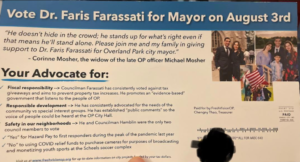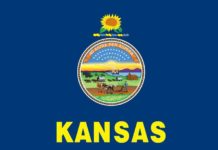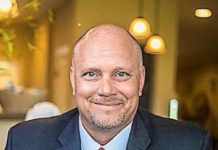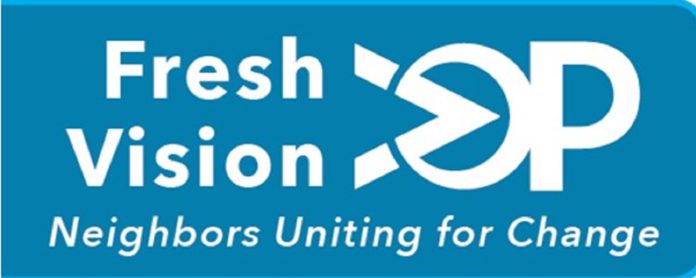State ethics officials have found that a nonprofit group of neighbors fighting development in Johnson County is a political action committee and needs to disclose where it gets its funding.
The state Ethics Commission ruled that Fresh Vision OP falls within the scope of the law defining a political action committee after it urged voters last year to vote for Overland Park City Councilman Faris Farassati for mayor.
The commission tabled the case this week to give the group 30 days to register with the secretary of state and file a campaign finance report.
A decision about any potential fines will be discussed after the group has a chance to file the reports. It’s possible any fine could be set aside if the reports are filed as required.
The group is incorporated as a social welfare group under 501(c)(4) of the federal tax code, meaning that it’s exempt from disclosing its donors and expenses under federal campaign finance law but not necessarily under state campaign finance law.
State law requires an organization to register as a PAC regardless of its tax status if its major purpose is to spend or contribute money for the nomination, election or defeat of a clearly identified candidate for state or local office.
Ethics official argued that Fresh Vision came under the state campaign finance law because in two instances – on a mailer and on its website – it expressly endorsed Farassati’s candidacy for mayor during the 2021 primary for Overland Park mayor.
“This organization clearly had a major purpose to expressly advocate for a particular candidate for office, which would be sufficient to qualify them as a political action committee,” Ethics Commission Executive Director Mark Skoglund told commissioners.
Ethics officials said the group had to have “a” major purpose of expressed advocacy not “the” major purpose.
The group’s president, James Muir, and treasurer, Chengny Thao, appeared before the commission in a hearing held on Zoom.
They both said the group was made up of neighbors whose major purpose was advocating for their community, not any particular candidate.
They opposed tolling on U.S. 69, new development at Overland Park’s arboretum and the use of rocky, oily material called chip seal that the city uses to preserve streets.
“Our major purpose – and almost exclusive purpose – is the social welfare of the neighborhoods and communities around which we live,” Muir told the commission.
“It is not to support a political candidate.”
Thao echoed a similar view.
“We are a bunch of neighbors just banding together to push forward on some of the social causes that we see that are impacting our neighborhoods,” she said.
Thao and Muir said they believed that the organization spent perhaps less than 15% of its time backing candidates for public office.
They couldn’t document how the group divided up their time, but said that would be very difficult given that the group does a lot of its work interacting with neighbors.
“Most of the work we do is face-to-face talking with people that are members of our community. It’s hard to give you any physical evidence of that,” Muir said.
Muir said the group raised a couple thousand dollars for its efforts. Ethics officials said that while they didn’t know how much the mailers cost, they believe it was a substantial amount of what Muir said was raised.
“There’s really no way to say that the express advocacy was not a major purpose,” said Brett Berry, general counsel for the ethics commission.
“Even if these other issues are a major purpose, express advocacy is one of those as well,” Berry said.
In making their case that endorsing a candidate was a “major” purpose of the group, ethics officials said that links to issues on the organization’s website didn’t go anywhere at the time of the mayoral primary.
“This seems to indicate that the issues the organization advocates for – there was no time spent developing the portion of their website that shows these issues,” Skoglund said.
Thao blamed the bad links on difficulties the group had with a website designer who was fired. She said there was an intent to go back and add information to those links.
“The evidence does not show they they’ve spent money on other issues other than perhaps a website,” Berry said.
“Just talking about it and attending maybe a City Council meeting and having concerns about the arboretum and chip and seal, just don’t demonstrate those to be a significant as where their money was spent.”
Ethics commissioners agreed that the group should be classified as a political action committee but commended them for their commitment and engagement.
“I understand their argument, but I believe the statutes and the law is against them,” said Commissioner Kyle Krull.
“To keep the playing field level, a PAC needs to act like a PAC,” Krull said.
“I would encourage them to register as a PAC and go forth with advocating their cause,” he said. “I applaud the passion.”
Commissioner Nick Hale also agreed that the group should be defined as a PAC.
“The Campaign Finance Act establishes standards of conduct for transparency and accountability,” Hale said.
“I also commend the commitment to the community,” he said.
“It’s just at a certain threshold, there is a standard of conduct that we expect participants in community engagement to follow,” he said.













